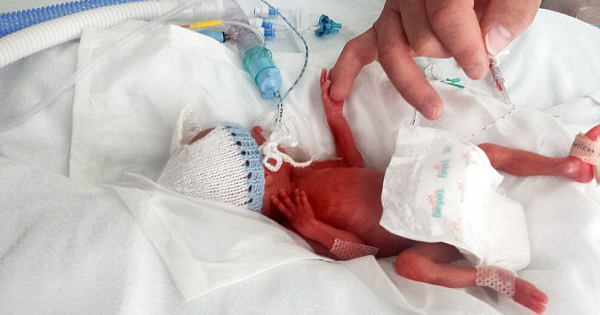Advertisement
When 32-year-old mother-of-one, Emma Bateman, learned that she was pregnant with triplets, was “surprised, but obviously thrilled.” She and her partner, Ray, had had a son 11 years prior and did want to have more kids, but “never quite got round to it.”
For several weeks, Emma assumed that their family would be growing from three to four – until her 12-week scan revealed that she wasn’t just pregnant with one child, but three.
Neither she nor Ray had any history of multiple pregnancies in their families, so it was a “complete shock” to hear the doctor say, “Oh, hang on, there’s another one,” during the ultrasound.
Emma and Ray’s excitement was, however, only momentary. Because all three of Emma’s children had come from the same egg (that had divided into three), they were all sharing the same placenta, effectively receiving less nutrition and support from their mother.
In the weeks following, doctors requested that Emma complete an ultrasound every two weeks, just to ensure that her children were doing fine. She otherwise tried to stay home; her fatigue and nausea made it difficult to do anything.
For a few weeks, Emma’s pregnancy seemed to be progressing fine and her children’s health seemed stable.
But at just 22 weeks, she began to experience mild contractions.
She recalled thinking, “This can’t be it.”
But it was. Emma’s contractions progressively got worse, so Ray immediately took her to the hospital. There, the doctor had to had a “pretty awful conversation” with Emma.
“At that stage they did not know what the prognosis was. We thought we had lost our babies and we were devastated,” Emma admitted.
Emma remained in the hospital so her doctors could give her steroid injections to help support her children’s underdeveloped lungs, but after two days, it was impossible to delay the delivery any longer. Her water had broke. Her sons were coming.
Alfie was born weighing 14.81 ounces, Connor was 15.16 ounces, and Dylan was 1 pound, 0.36 ounces. All three had to be rushed off to special care where their lives and health were supported by incubators, tubes attached to their bodies all over.
For months, the Bateman family remained together in the hospital, enduring health scares and complications.
The boys were born in August, but it was only in February that they were all deemed strong enough to return home for good.

Now, the boys are two years old, and in fantastic health. They tumble and play together at home, giving their parents – and their older brother – more than enough to mind for years to come.




